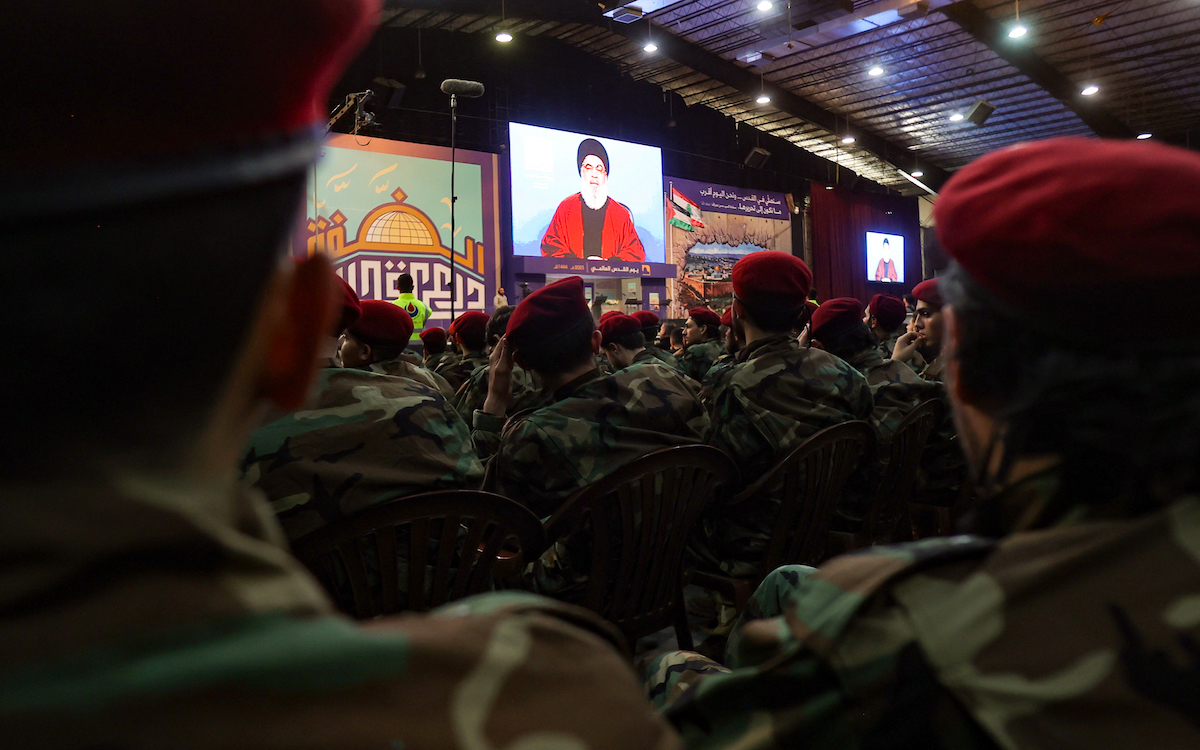
The Liberation Day speech by Hezbollah Secretary General Hassan Nasrallah should be concerning for every Lebanese. Out of a dozen ideas that he presented, only one made sense, and only tangentially.
To give the Hezbollah chief credit where it is due, he declared that security and stability are the key to economic growth and prosperity. Fair enough. But how does Nasrallah think stability will come to Lebanon when, in the same speech, he waxed poetic about wars with Israel, past and present? What investor listens to Nasrallah’s speech promising wars and decides to open shop in Lebanon?
Nasrallah got only one thing right, and then only half right. He, however, got everything else wrong. For starters, it seems that Nasrallah believes that “the great war with Israel” is coming, and that Israelis are so frightened that they have packed their bags and have one foot outside the region.
Nasrallah, whose country’s currency has lost 98 percent of its value in a little over three years, trolled Israelis, making fun of the depreciation of their Shekel against the Dollar, a normal fluctuation that did not cause alarm in Israel, or anywhere else.
The Hezbollah chief then preached the coming of a new world order that will eclipse American power. Nasrallah might be right that the “Washington Consensus” — a Neo-Liberal school of economics that prescribes de-regulation and free trade as the way for economic growth — is not in fashion anymore. But to jump from that to the conclusion that American power is waning is a fallacy.
As it stands, the Chinese economy is now stuck in second gear after its rulers refused to switch to third gear by adopting liberal values and democracy, which could have unleashed creative thinking and endless economic growth possibilities.
Russia, for its part, has shown its real self: A spent power and a remnant of a once mighty army that is now mediocre and supported by a mid-size economy and power. As for India, it is too populous and chaotic to pull its weight, while Brazil and South America are sinking into leftist populism that has killed economic growth. South Africa is falling apart at the seams.
In brief, BRICS is no more and the world will remain unipolar with America at its helm.
Perhaps Nasrallah does not like to think about it, but the only power that is still growing, inventing and rising, is America. The U.S. population is four percent of the global population. Its economic output makes up one-fourth of the world economy. With its allies in the G7, America controls close to half of the global economy, and China — at fifteen percent with an aging population and declining economic growth — does not have the depth to take on America, on whose market Beijing relies for its exports that fuel the Chinese economy.
Then, there is Israel, a regional superpower by any measure. Like the rest of the misinformation in his speech, Nasrallah incorrectly claimed that gone are the days when Israel could strike anywhere with impunity. Perhaps Israel has not gotten Nasrallah’s memo because — over the past few years — it has been pounding Hezbollah and Iranian targets in Syria, with total impunity. Israel has even struck inside Iran, with Tehran unable to respond except through instigating Palestinians to fight Iran’s fight.
When Palestinians did, like in the quick round of war between Israel and Palestinian Islamic Jihad (PIJ) earlier this month, the Israelis ended up taking out eleven top PIJ leaders and four militants with the Palestinian Front for the Liberation of Palestine (PFLP). Israeli accuracy was high and collateral damage was low. This probably convinced Hamas of the futility of jumping into the fray. For all Nasrallah’s talk about “unifying the fronts,” Hamas sat the last war in Gaza out and watched PIJ get pounded.
In a country in shambles, suffering of a free-falling economy and the inability to find solutions, let alone pursue them, Nasrallah’s delusions become extremely destructive for Lebanon. He not only wasted the Lebanese’s time and promised an imaginary rosy future, but he also delivered a totally misinformed presentation about global and regional powers.
It has been decades since Nasrallah promised ultimate victory, which entails annihilating Israel. Given his track record in broken promises, as Lebanon continues its free fall, it is unlikely that many Lebanese still listen to Nasrallah, let alone believe him. Perhaps that’s why he’s been itching for a fight with Israel, throwing rockets and flying drones, hoping that troublemaking will keep him and his militia relevant. Otherwise, Lebanon’s de facto ruler has little else to offer, whether in his speeches or in real life.
Hussain Abdul-Hussain is a research fellow at the Foundation for the Defense of Democracies (FDD) in Washington, DC.







